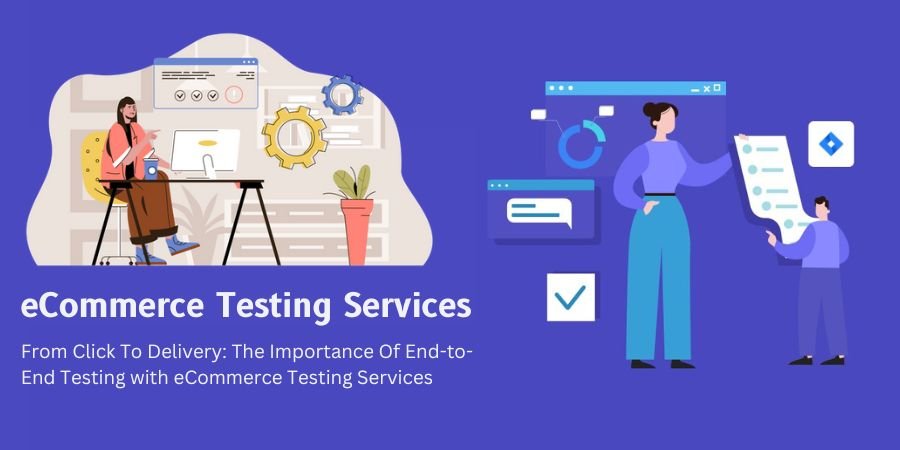The eCommerce industry has witnessed explosive growth in recent years, with businesses of all sizes establishing their presence online. Consumers now turn to online platforms for everything from groceries to electronics, creating a significant shift in shopping habits. However, this growth has introduced complexities into online systems and processes. To ensure a seamless customer experience across channels and the proper functioning of systems from start to finish, end-to-end testing with eCommerce web testing services is crucial.
Challenges With eCommerce Delivery
Delivering a seamless customer experience in the eCommerce realm is no easy task due to several challenges:
- Legacy Systems: Many retailers still rely on legacy systems and platforms that do not easily integrate with newer online channels.
- Third-Party Integrations: Online stores depend on various third-party systems for payments, shipping, tax calculation, and more. These diverse systems must work harmoniously.
- Cross-Channel Consistency: Customers expect a consistent brand experience across the website, mobile apps, online marketplaces, and in-store.
- Order Fulfillment: Automating and coordinating processes such as online orders, inventory management, warehousing, and shipping is crucial but complex.
- Delivering at Scale: Managing a high volume of orders while maintaining order accuracy is a monumental challenge.
- Different Customer Journeys: Supporting diverse customer journeys, such as B2B, B2C, mobile users, and various payment methods, adds complexity.
Without comprehensive testing, these challenges can result in a multitude of issues, including cart abandonment, payment failures, order errors, delivery delays, and a subpar customer experience.
The Need For End-to-End Testing
To ensure smooth eCommerce operations, businesses must adopt an end-to-end perspective and conduct thorough testing in the following areas:
- User Journeys Across the Application: Test user flows across critical journeys like search, browsing, adding to the cart, and checkout. Verify links, forms, error handling, and more.
- Integration Across Systems: Test the integration points between the eCommerce platform, payment gateways, ERP systems, and other backend systems.
- Business Processes from Order to Fulfillment: Validate order management, inventory updates, warehouse order processing, and shipping integration.
- Cross-Channel Functionality: Ensure a consistent experience across mobile apps, websites, and other touchpoints.
- Performance Under Load: Test the system’s ability to handle peak traffic and large order volumes.
- Security Across All Components: Perform tests related to SQL injection, cross-site scripting, SSL configuration, and other security aspects.
- End-to-End Regression: Before releases, validate that the entire system behaves as expected.
Comprehensive end-to-end testing is the key to ensuring a seamless online customer journey across various touchpoints and successful order fulfillment.
Scope Of eCommerce Testing
eCommerce testing encompasses a wide range of applications, integrations, and business processes. Key areas for testing include:
- Website Testing: This includes thorough testing of the eCommerce website and mobile application across different platforms, covering functional, visual UI, compatibility, performance, security, and accessibility aspects.
- Backend Testing: Validating the backend systems supporting order management, including inventory management, payment gateways, tax calculation engines, shipping systems, warehouse management systems, and ERP integration.
- Business Process Validation: End-to-end validation of fulfillment workflows, including order submission, payment authorization, and processing; inventory updates; shipping integration; warehouse order processing; exceptions and error handling; and return and refund processing.
- Customer Experience Validation: Testing across channels from the perspective of the customer experience, including purchase checkout completion rates, path analysis, funnel analysis, performance, and cross-channel consistency.
- Operational Acceptance Testing: Testing everyday business scenarios and edge cases, such as peak order volumes during holiday seasons, new product launches, promotional campaigns, inventory synchronization, and failover testing.
- Security Testing: Validating security across online applications, integrations, and platforms, covering secure coding practices, vulnerabilities like cross-site scripting and SQL injections, encryption testing, vulnerability scanning, server configuration, and access control.
- Compliance Testing: Ensuring compliance with regulatory requirements, including PCI compliance, HIPAA, and accessibility standards.
Significance Of Test Automation
Given the size and complexity of eCommerce systems, test automation provides several advantages, including:
- Faster Test Cycles: Automated tests execute much faster compared to manual testing, providing quicker feedback on regressions.
- Reliability: Automated tests perform the same steps consistently, delivering reliable results.
- Comprehensive Coverage: Automation allows for large test volumes, resulting in better coverage.
- Reusability: Test scripts can be reused across test cycles, offering a high return on investment.
- Testing Ease: Automation makes it easier to test complex workflows, negative scenarios, and more.
- Headless Testing: Automation enables testing without UI limitations.
- Operational Efficiency: Automation reduces maintenance overhead for large-scale test execution.
- Improved Release Velocity: Automated regression testing enables faster and more reliable releases.
The increased test coverage and frequency provided by intelligent test automation are invaluable for ensuring high-quality digital experiences consistently across channels.
Partnering With eCommerce Testing Services
Given the expertise and specialized skills required to test modern digital platforms, many companies choose to partner with expert eCommerce testing service providers to enhance their quality assurance efforts. Some advantages of leveraging managed services include:
- Deep Domain Expertise: Gain access to in-depth domain knowledge crucial for thorough and relevant testing and test optimization. eCommerce testing service teams possess expertise across various verticals, including retail, travel, grocery, pharmacy, and more.
- Specialist Skill Sets: Leverage skills in test automation, performance testing, mobile testing, and other specialized areas that may be lacking internally. Specialized testing services provide access to expert knowledge.
- Time to Test, Not Build: Get up and running faster without the overhead of hiring and training new QA teams.
- Accelerated Test Coverage: Scale test coverage across various browser and device combinations that may be impractical to manage internally.
- Latest Processes & Tools: Benefit from up-to-date testing processes, automation frameworks, and reporting methods adopted by service firms.
- Economies of Scale: Optimize testing costs by leveraging a shared services model without fixed employee overheads.
- Improved Release Velocity: Significantly boost release confidence and frequency through expanded test coverage.
- Unbiased External Perspective: Identify gaps and areas of improvement through objective third-party evaluations.
Conclusion
End-to-end testing stands as a fundamental element for successful eCommerce delivery. It validates the entire customer journey, reveals integration gaps between systems, ensures seamless workflows, and provides confidence at scale. Intelligent test automation and specialist testing services empower eCommerce companies to achieve the end-to-end quality validation needed to delight customers.

